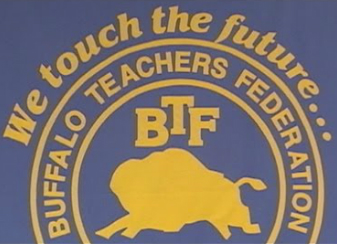BUFFALO – Public school boards in New York state should be careful about agreeing to expensive collective bargaining agreements with employee labor unions.
They could be stuck with paying for those contracts for years on end.
MORE NEWS: Know These Before Moving From Cyprus To The UK
The Buffalo school district is a perfect example.
The school board negotiated a very generous labor contract with the Buffalo Federation of Teachers, calling for the district to pay 100 percent of employee health insurance premiums, fund a cosmetic surgery program for qualified employees, and pay for other similarly expensive provisions.
But that contract expired in 2004 – a full 11 years ago – yet its terms are still in effect.
 That’s because the school board and the union have been unable to negotiate a new contact over the years, and New York state law allows public employees to enjoy the provisions of their expired labor contracts in perpetuity, until a new pact is negotiated.
That’s because the school board and the union have been unable to negotiate a new contact over the years, and New York state law allows public employees to enjoy the provisions of their expired labor contracts in perpetuity, until a new pact is negotiated.
That rule derives from the Triborough Amendment to the Taylor Law, which was enacted in 1982.
“The 1982 Triborough Amendment to the Taylor Law prohibits a public employer from altering any provision of an expired labor agreement until a new agreement is reached,” explains the website Stopthetaxshift.org.
“This amendment, which was originally approved with the strong support of unions, has the effect of requiring automatic pay increases where a salary step schedule or longevity schedule exists, even though the labor agreement has expired. Consequently, a public employer’s salary costs continue to rise even when labor negotiations have reached an impasse.
MORE NEWS: How to prepare for face-to-face classes
“The Triborough Amendment also undermines the collective bargaining process by discouraging unions from offer concessions or givebacks since, as long as no new agreement is reached, the terms of the current contract remain in effect.”
Earlier this year the Buffalo school board and BFT began negotiations once again on a new contract, but the talks went nowhere, and negotiations are again at a standstill.
That means the district’s plan to cut a lot of unnecessary costs, and redirect the revenue into classrooms, will have to remain on the shelf.
In exchange for a very generous 23 percent salary increase over four years, the school board asked the union for numerous changes, according to the Buffalo News.
One proposal was the elimination of the cosmetic medical coverage, which has cost the district in the neighborhood of $5 million annually in recent years.
The school board also sought other cost-saving changes, including reduction of paid sick days from 12 per school year to 10, a reduction of paid personal days from five to two, freezing of the union sick leave bank at current levels; having the district pay 80 percent rather than 100 percent of health insurance premiums for employees, increasing medical visit co-pays from $5 to $15, and increasing prescription co-payments from a maximum of $10 to a maximum of $40.
Clipping the skyrocketing costs of health care coverage was obviously a critical goal for the district.
The Buffalo district paid an average of $3,580 per teacher for single coverage in 2004, the year the contract expired, according to the Buffalo News. That has jumped to a current average of $7,186 per year, an increase of more than 101 percent. For family coverage, the number rose from $9,347 to $18,694, a 100 percent jump.
With no change in the terms of insurance financing, the cost will continue to increase at a rapid rate.
According to the school district’s current four-year financial plan, the cost of employee health insurance will increase from $54.7 million this year to $62.4 million in 2018-19, an increase of 7.7 percent.
The same estimate says the cost of retiree health insurance will increase from $68.5 million this year to $79.2 million in 2018-19, an increase of 15.6 percent.
Those are big potential costs for a school district that was facing a $50 million budget deficit as recently as 2014.
Yet the district remains in the financial stranglehold of a labor contract negotiated years ago by a long-departed school board, due to the Triborough Amendment.
As Stopthetaxshift.org summed it up, “The Triborough Amendment should be repealed so that public employers and employees can be encouraged to work together to achieve labor contracts that are both fair and affordable.”


Join the Discussion
Comments are currently closed.